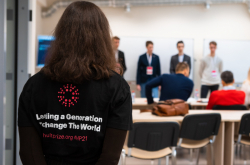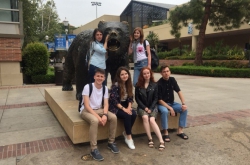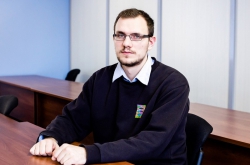In December 2016, ITMO University initiated the International Social Entrepreneurship Festival in St. Petersburg. Authors of the best projects were given an opportunity to have an internship at University of California, Los Angeles (UCLA), where specialists from different countries exchanged experience in the field of social design. The participants of the training studied aspects of social entrepreneurship and its history in the USA. They visited several business accelerators and non-profit organizations that focus on social projects, and learned about cases by social entrepreneurs.
"We think about using the American experience in Russia, with regards to our mentality and other peculiarities. Another question is how to make social projects created by our students more commercial. Now they are completely volunteering so we aim to prepare them for commercialization. During the internship, we saw how social projects turned into promising business models," says Alena Stepanishcheva, head of ITMO’s Student Volunteering Center.

Here are projects presented by ITMO’s specialists during their internship:
CognitionApp
Roman Malushkin, student of the Faculty of Infocommunication Technologies, created an app for supporting people who suffer from Alzheimer’s disease. The application includes two functions: special algorithms detect whether a patient has Alzheimer’s or not, and if yes, determines a state of disease and sends the information to a physician. To create the algorithms the developer used a methodology created by specialists of St.Petersburg Psychoneurological Research Institute. The app also contains special brain exercises. This is what makes the project socially important; at the same time, the app can find its market niche. The system can be used in adult care facilities. This may become an extra service — the relatives of elderly people can order CognitionApp in order to monitor the state of disease.
NoteworthyEvent
The project was developed by ITMO’s students Nikolay Turov and Murod Khaidarov. NoteworthyEvent is an information system for public events. It can assist juries in evaluating participants, and also includes an app using which visitors can interact with speakers by asking question.
This project seems commercial, but if non-profit organizations were to receive an opportunity to use the app for free, Noteworthy Event may be seen as a project contributing to social needs.

Using the American experience
"We learned about the structure of UCLA’s departments that support social projects of students. ITMO’s social and volunteering departments have many common features with UCLA’s ones. Our colleagues provide projects similar to those we develop," says Yuri Kuporosov, member of ITMO’s Social Design and Entrepreneurship Center.
According to Mr. Kuporosov, having analyzed the example of American colleagues, ITMO’s specialists came to the point that social and volunteering departments of the university have to cooperate more in order to increase their effectiveness.
One of the peculiarities of the American system for development of social design is that most of the projects focus on both social assistance and commercial benefit. Those who commercialize their ideas always pay attention to solving some particular social problem.

"In the USA, we talked to specialists of a volunteering center. They shared that it is common for students to start their social activities as assistants at non-profit organizations. There, they may see the results of their work, and then create their own projects. When we ask Russian students why they don’t want to make profit of their volunteering activities, they cannot give reasonable answers because they don’t understand how these things are connected," notes Ms. Stepanishcheva.
These days, crowdfunding platforms are very popular in the USA. ITMO’s specialists believe that those entrepreneurs, who develop digital startups, can use various international services in order to find money for their projects.
The participants of the internship also noted that American universities collaborate with many non-profit organizations where students can solve socially important issues and at the same time earn money. Using this background, they can easily launch their own projects.
The Social Design and Entrepreneurship Center plans to use this model. The specialists don’t want to limit students — they believe that young entrepreneurs have to gain experience at various volunteering and non-profit organizations, so as to understand how to use their experience for the good of society.





